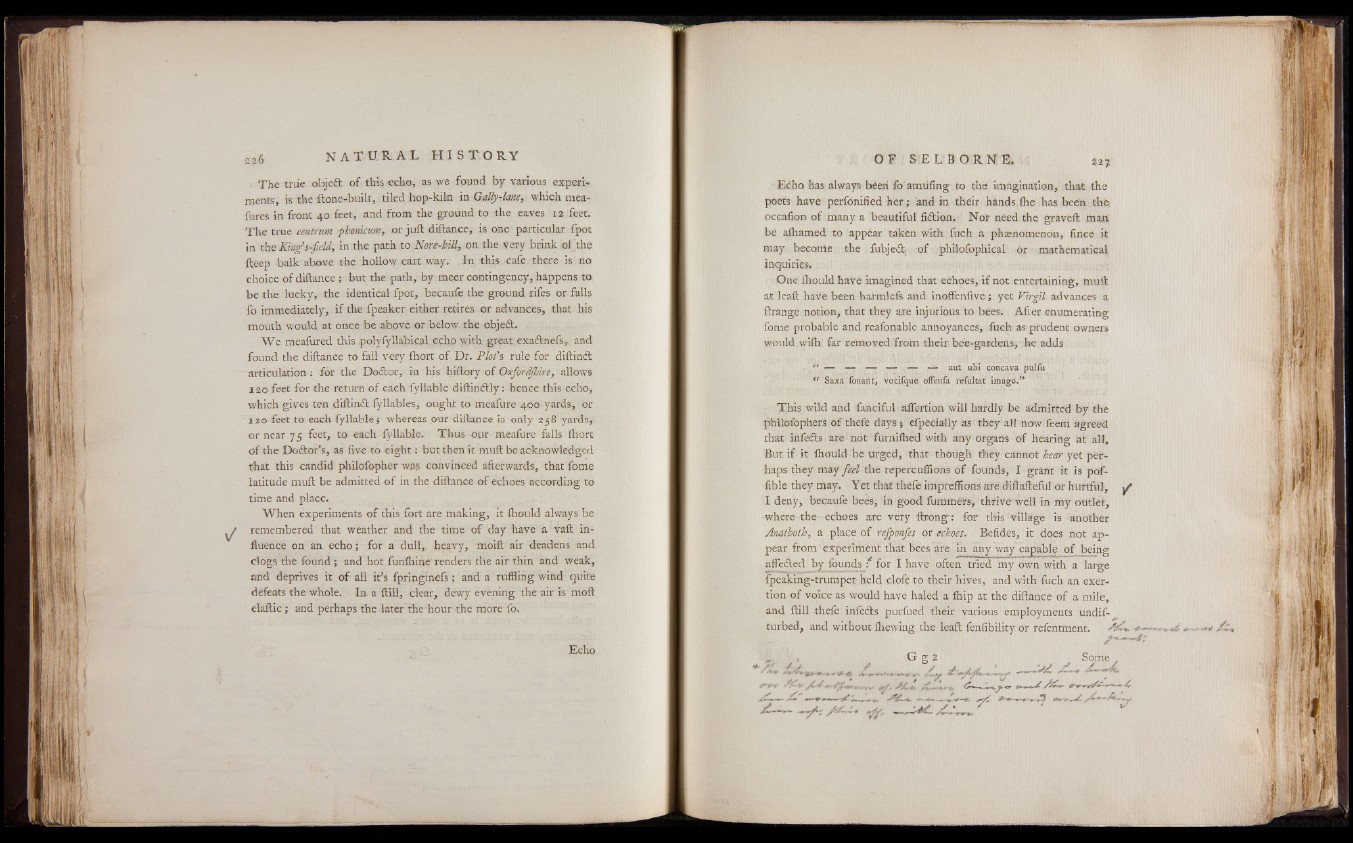
: The trrie objedt of this echo, as we found by various, experiments,
is the ftone-built, riled hop-kiln in Gdly-lane, which mea-
fures in front 40 feet, and from the ground to the eaves 12 feet.
The true antrum phonicum, or juft diftanee, is one particular fpot
in the King’s-field, in the path to Non-hiU, on the very brink of the
fteep balk above the hollow cart way. In this cafe there is no
choice of diftanee; but the path, by meer contingency, happens to
be the lucky,■ the identical fpot, becaufe the ground rifes or falls
fo immediately, if the fpeaker either retires or advances, that his
mouth would at once be above or below, the objedt.
We meafured this polyfyllabical echo with great exadtnefs, and
found the diftanee to fall very Ihort of Dr. Plot’s rule for diftindt
articulation : for the Boftor, in his hiftory of Oxfordfhire, allows
120 feet for the return of each fyllable diftinctly: hence this echo,
which gives ten diftindt fyl'lables, ought to meafure 400 yards, or
' 120 feet to each fyllable; whereas our diftanee-is only 238 yards,
or near 75 feet, to each fyllable. Thus our meafure falls Ihort
of the Dodtor’s, as five to e igh t: but then it muft be acknowledged
that this candid philofopher was convinced afterwards, that fome
latitude muft be admitted of in the diftanee of echoes according to
time and place.
When experiments of this fort are making, it fhould always be
remembered that weather and the time of day have a vaft influence
on an echo; for a dull, heavy, moift air deadens and
clogs the found; and hot funlhine' renders the air thin and weak,
and deprives it of all it’s fpringinefs; and a ruffling wind quite
defeats the whole. In a ftill, clear, dewy evening the air is moft
elaftic; and perhaps the later the hour -the more fo.
Echo
O F S E L B O R N E.
Echo has always been fo' armifing to the imagination, that the
poets have perfonified her; and in their hands fhe has been the
oceafion of many a beautiful fidtion. Nor need the graveft man,
be afhamed to appear taken with fuch a phenomenon, fince it
may become the fubjedt; of philofophical or - mathematical
inquiries.
One Ihould have imagined that echoes, if not entertaining, muft
at leaft have been harmlefs and inoffenftve; yet Virgil advances a
ftrange notion, that they are injurious to bees. After enumerating
fome probable and reafonable annoyances, fuch as prudent owners
would wilh far removed from their bee-gardens, he adds
/ ct — —f — ■ — . — — aut ubi concava pulfu
it Saxa fonant, vocifque oftenfa refultat imago.**
This wild and fanciful afiertion will hardly be admitted by the
philofophers of thefe days 5 elpeeially as they all now Teem agreed
that irtfedts are not furnilhed with any organs of hearing at all.
But if it Ihould be urged, that though they cannot hear yet perhaps
they may feel the repercuffions of founds, I grant it is pof-
fible they may. Yet that thefe impreffions are diftafteful or hurtful, ^
I deny, becaufe bees, in good fummers, thrive well in my outlet,
where the echoes are very ftrong: for this ^village is another
Anathoth, a place of refponfes or echoes. Befides, it does not appear
from experiment that bees are in any way capable of being
affedted by founds : for I have often tried my own with a large
fpeaking-trumpet held clofe to their hives, and with fuch an exertion
of voice as would have haled a fliip at the diftanee of a mile,
and ftill thefe infedts purfued their various employments undif-
turbed, and without fhewing the leaft fenfibility or refentment.